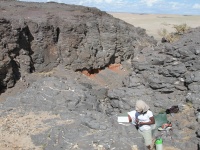| Ligne 4 : | Ligne 4 : | ||
|align="center" style="background-color:#E86A13"| | |align="center" style="background-color:#E86A13"| | ||
'''Fatim Hankard'''<br/> | '''Fatim Hankard'''<br/> | ||
| - | ''Laboratoire de Paléomagnétisme | + | ''Laboratoire de Paléomagnétisme |
| - | + | Institut du Globe de Paris" | |
|width="20%" style="background-color:#E86A13"| | |width="20%" style="background-color:#E86A13"| | ||
__TOC__ | __TOC__ | ||
Version du 23 janvier 2006 à 19:06
|
Fatim Hankard |
|
Recherche
Mes travaux de thèse portent sur le problème de « Paléomagnétisme et Tectonique: Mécanismes de déformation de la lithosphère continentale Eurasiatique et Anomalie d’Inclinaison Tertiaire », au Laboratoire de Paléomagnétisme sous la direction de Jean-Pascal Cogné
Publications
- A new Late Cretaceous paleomagnetic pole for the west of Amuria block (Khurmen Uul, Mongolia)
- Late Jurassic–Early Cretaceous closure of the Mongol-Okhotsk Ocean demonstrated by new Mesozoic palaeomagnetic results from the Trans-Baïkal area (SE Siberia)
Congrès
- F. Hankard, J-P. Cogné, X. Quidelleur, P. Lklagvadorj, A. Bayasgalan, V.A. Kravchinsky (2005), Paleomagnetism and K-Ar Dating of two Cretaceous and Tertiary localities from Mongolia:Implications on the Large Scale Deformation of Eurasia. Eos Trans. AGU, 86 (52), Fall Meet. Suppl. , Abstract GP11A-0010, San Franscisco, USA. (Poster).
- J.-P. Cogné, V. Kravchinsky, Halim N., Gilder S., F. Hankard (2005), Closure of the Mongol Okhotsk Ocean as Constrained by Late Permian to Early Cretaceous Paleomagnetic Data from the Suture Zone, Eos Trans. AGU, 86 (52), Fall Meet. Suppl., Abstract GP13B-01, San Franscisco, USA. (Oral )
- F. Hankard, J.-P. Cogné, P. Lkhlavadorj, A. Bayasgalan (2005), A new Tertiary paleomagnetic pole at 47 Ma from Mongolia : Implications on the Inclination Shallowing Problem of Central Asia. Geophysical Research Abstracts, Vol. 7, 07651, Vienna, Austria. (Oral )
- F. Hankard, J.-P. Cogné, L. Carporzen, P. Lklavadorj, A. Bayasgalan (2005), New Tertiary paleomagnetic poles from Mongolia and Siberia : Implications on rigid or non-rigid Eurasian Plate. Geophysical Research Abstracts, Vol. 7, 07788, Vienna, Austria. (Poster)
- F. Hankard, J.-P. Cogné (2005), New Tertiary paleomagnetic poles from Mongolia and Siberia at 13, 20 and 30: Implications on rigid or non-rigid Eurasian, IPGP Graduate Students Annual Meeting. (Oral)
- F. Hankard, J.-P. Cogné, V. Kravchinsky (2004), New Tertiary paleomagnetic poles at 13 and 30 Ma from Mongolia : Clues on the Inclination Shallowing Problem in Central Asia. Eos Trans. AGU, 85 (47), Fall Meet. Suppl., Abstract U33A-0029, San Franscisco, USA. (Poster)
- F. Hankard, J.-P. Cogné, V. Kravchinsky (2004), A new Late Cretaceous paleomagnetic pole for the Amuria block (Khurmen Uul, Mongolia) and its tectonic implication. GeophysicalResearch Abstracts, Vol. 6, 04056, Nice, France. (Oral)
- F. Hankard, J.-P. Cogné (2004), Nouveau pôle d’âge Crétacé Supérieur en Mongolie: Implicationssur les déformations continentales en Eurasie, IPGP Graduate Students Annual Meeting. (Oral)
- F. Hankard, J.-P. Cogné, V. Kravchinsky (2003), New Tertiary and Cretaceous paleomagnetic poles from Mongolia : Implications on deformation of Eurasia. Geophysical ResearchAbstracts, Vol. 5, 08816, Nice, France. (Poster)
- F. Hankard, J.-P. Cogné (2003), Etude paléomagnétique de basaltes Tertiaires et du Crétacé en Mongolie et en Sibérie: Implications sur le problème de l’Anomalie d’Inclinaison, IPGP Graduate Students Annual Meeting. (Poster)
Enseignement
Je fais les TDs du module Panorama des Sciences de la Terre modernes (2).













